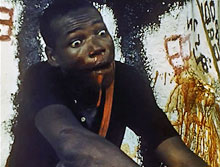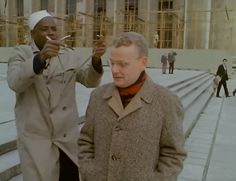STUDIO: Icarus | DIRECTOR: Jean Rouch
RELEASE DATE: 11/14/17 | PRICE: DVD $44.95
BONUSES: The documentary Jean Rouch, the Adventurous Filmmaker, booklet with essays by historians Paul Stoller and Eric Kohn
SPECS: NR | 574 min. | Documentary | 1.37:1 widescreen | mono | French with English subtitles
If one looks up Jean Rouch online, one might expect Eight Films by Jean Rouch to be a collection of rather staid, “fly on the wall” studies of African (and French colonial) culture. Instead, the eight films included here are extremely entertaining movies that simultaneously obey and overturn the rules of documentary filmmaking.
Rouch (1917-2004) is best known for his cinema verite documentary about Paris, Chronicle of a Summer, but the bulk of his work (and his life) was involved with African life, in particular the customs and behavior of the people of Nigeria. The early films in this collection are straightforward docs, but from the late Fifties on, Rouch experimented with fictional scenarios devised and acted out by Nigerians who comprised his stock company of “stars” for many years.
He labelled the mode he worked in “ethnofiction,” since he was first and foremost an ethnologist. The films range from the good (The Human Pyramid, blighted a bit by poor performances) to absolutely revelatory masterworks (Jaguar, Petit a Petit).
Rouch is one of the handful of filmmakers and critics who exerted a powerful influence on the French New Wave. This came from his use of a handheld camera, exclusively shooting in real locations and allowing for sudden inspiration and improvisation from the performers. The later films in this collection show Rouch in full flower, creating his own style while still exploring the nuances of Nigerian culture.
The early short “The Mad Masters” (1956) still stands as a disturbing viewing experience. In it we see Nigerian men who are possessed by spirits that cause them to foam at the mouth and drink the blood of a dog. (“Masters” and the feature The Lion Hunters contain the onscreen killing of animals — although the killings are placed in a cultural and religious perspective, with the hunters saluting the spirits of their prey.)
What is going on is less mumbo-jumbo and more akin to therapy, as the personas the possessed men take on are those of the British colonial authority. Thus, while the film at first seems exploitative of its subjects, it soon becomes a clever spoof of those that oppress them.
Moi, Un Noir (1959) is the best known of Rouch’s ethnofictions, and it certainly has retained its charm nearly five decades on. Rouch worked with the actors to tell their real-life stories of trying to find work while also presenting their hopes and desires. The film’s leads are identified by movie-star nicknames (“Edward G. Robinson,” “Eddie Constantine,” “Dorothy Lamour”) and every so often we witness them experience a triumph that is revealed to be a beautifully rendered fantasy.
Rouch had further refined his techniques and his ensemble of actors their storytelling skills by the time of Jaguar (1967), an equally engaging feature about three Nigerians traveling to Ghana (then called the Gold Coast) to see what business opportunities they can discover.
The leads of Jaguar were reunited for what is certainly one of Rouch’s finest achievements, Petit a Petit (1971). In its original cut, the film ran over four hours (and that incarnation of the film is indeed worth the ride). The version included here is Rouch’s own 90-minute theatrical cut of the material.
The film is a sharp satire of ethnographic study, with Nigerian businessman Damouré Zika (a friend of Rouch’s, who became a noted Nigerian filmmaker) visiting Paris to learn how to build a skyscraper for his business. He conducts improvised studies of real people on the streets of Paris (checking their head size, how many teeth they have, and other demeaning physical details) that beautifully satirize the studies on Africans conducted by Europeans over the decades.
Petit contains many memorable set-pieces, as Zika travels around Paris and then returns to his homeland with the “results” of his study, which have turned him into a pompous materialist. While all of the films in this collection have their merits, Petit is truly the most innovative and entertaining item in the set.
The “odd man out,” in terms of subject matter, is Punishment (1964), which is still quite charming and demonstrates Rouch’s talent for quickly sketching characters. The one-hour feature takes place in Paris and follows a girl who has been expelled from her school for one day as she roams around the city. She encounters a variety of different types of men — from make-out artists to platonic friends to fatherly types. It’s a fascinating portrait of a teen in transition and the ways that men befriend, counsel, flirt and blatantly come on to women they’ve just met.
A documentary called Jean Rouch, the Adventurous Filmmaker (2017) completes the package. It offers a mini-biography of Rouch, following the trajectory of his life from his initial work as an engineer to his growing fascination with the cinema and his forging of an entirely new style of filmmaking.
The piece focuses primarily on the importance his work had on Nigeria, in terms of its reflecting the day to day realities of the country’s citizens and offering them a blueprint for how to become filmmakers themselves.
The doc contains many poignant moments in which Rouch’s colleagues and friends remember him fondly, but it is most moving when it focuses on how Rouch chronicled various ways of life that have disappeared in Nigeria.
|
Buy or Rent Eight Films by Jean Rouch
on DVD
|
|---|


Leave a Reply